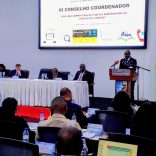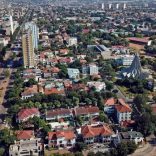Mozambique: Latest terror attacks displace 12,000 people - AIM | Watch
Mozambique: CNE rejects audit of Gaza registration – AIM report

File photo (for illustration purposes only): DW
Mozambique’s National Elections Commission (CNE) has rejected an offer to audit the results of the April-May voter registration in the southern province of Gaza.
The dispute over Gaza arises because of the impossible figures given by the CNE for the number of registered voters in the province. The CNE’s executive body, the Electoral Administration Technical Secretariat (STAE), set a target for voter registration in Gaza of 1.14 million, and the final number of voters supposedly registered in the province was 1,166,011.
The CNE simply rubber stamped this figure, even though it is almost 330,000 more than the figure for voting age adults given by the 2017 population census. The census counted the number of people in Gaza at 1,422,460. At a population growth rate in the province of 1.2 per cent), the projected size of the Gaza population in 2019 is 1,456,599.
The National Statistics Institute (INE) says that of this figure 836,581 people are aged 18 and above and are thus entitled to register as voters. The CNE somehow produced an extra 330,000 adults in the province: if the CNE’s figures are right, they would mean that the census had missed out the equivalent of an entire city.
On 12 August, Mozambique’s main anti-corruption NGO, the Centre for Public Integrity (CIP), offered to arrange an independent audit of the Gaza registration, at no cost to the CNE.
But the CNE has turned the offer down, on the grounds that the Gaza figures are now sub judice. This is because the main opposition party, the former rebel movement Renamo, has taken the matter to the Attorney-General’s Office (PGR), which has started a criminal investigation.
In a letter dated 22 August, CNE chairperson Abdul Carimo argued that handing over the Gaza data to auditors might “obstruct the investigative measures being undertaken by the PGR”.
Carimo did not deny that the Gaza figures were suspicious. He said that matters such as wrongful registration, or the falsification of electoral registers are criminal offences. Since there were “strong suspicions that crimes have been committed, and since an investigation or criminal inquiry is under way”, any other intervention in the same matter could be regarded as “obstruction of justice”.
He suggested that the best course of action was to wait calmly for the PGR to complete its work. But there is no indication when that might be.
CIP contests Carimo’s logic, pointing out that Article 75 of Mozambique’s Criminal Procedure Code makes specific allowance for external expert evidence, which such an audit would provide.
CIP believes that an audit could be held quickly, without compromising the 15 October date for the elections.
The issue is important because parliamentary seats are allocated by provincial constituencies in proportion to the number of registered voters in each province. An extra 330,000 votes gives Gaza an extra nine seats, which should have gone to other provinces.












Leave a Reply
Be the First to Comment!
You must be logged in to post a comment.
You must be logged in to post a comment.